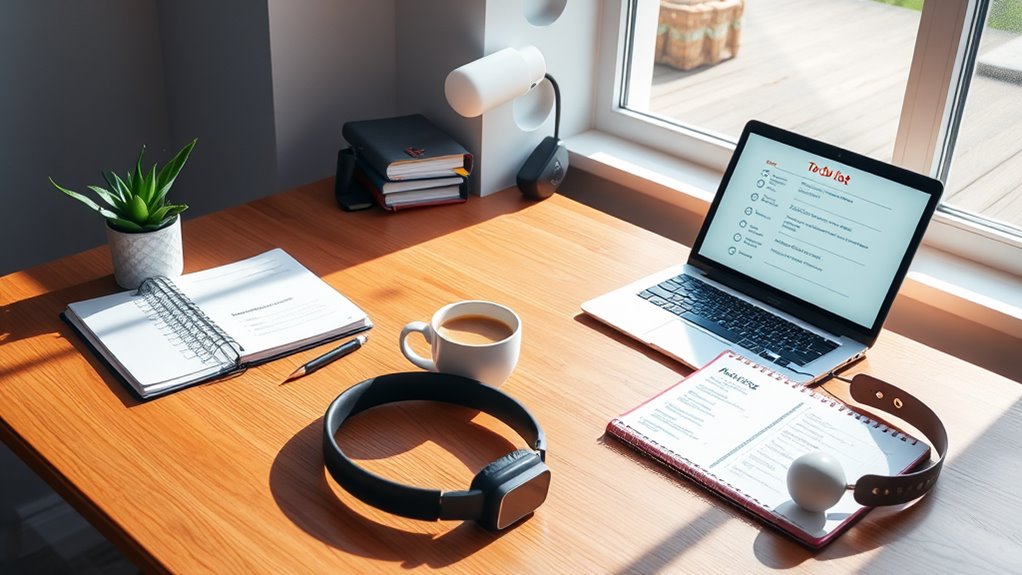Procrastination No More- The One Hack That Fixed My Focus
You can conquer procrastination and boost your focus with one powerful hack: the 2-Minute Rule. When you spot a task that takes two minutes or less, tackle it immediately. This simple practice prevents small tasks from piling up and overwhelming you. Completing quick jobs not only clears your mental space but also builds momentum for larger tasks. By minimizing distractions and focusing on short tasks, you’ll feel more accomplished and motivated. Want to reveal even more strategies for overcoming procrastination and sharpening your focus? There’s much more you can explore to enhance your productivity!
Key Takeaways
- Implementing the 2-Minute Rule helps tackle small tasks immediately, reducing mental clutter and enhancing focus.
- Recognizing triggers for procrastination empowers you to take action and manage time effectively.
- Creating a distraction-free environment boosts concentration and minimizes interruptions during work.
- Practicing mindfulness techniques can improve awareness and cognitive function, leading to better focus.
- Taking regular breaks prevents fatigue, allowing for sustained productivity and enhanced focus on larger tasks.
Understanding Procrastination
Procrastination affects nearly everyone at some point, often leading to stress and missed opportunities. You might find yourself delaying important tasks, even when you know it’s not in your best interest.
Understanding why you procrastinate is vital. It’s often linked to fear of failure, perfectionism, or feeling overwhelmed. When you face a challenging task, it’s easy to get sidetracked by distractions or less important activities.
Recognizing these triggers can empower you to tackle them head-on. Ask yourself what’s holding you back. Is it the fear of not doing it perfectly?
The Science Behind Focus
While many factors can disrupt your focus, understanding the science behind it can help you regain control. Your brain processes information through various networks, particularly the prefrontal cortex, which manages attention. When you minimize distractions, you enable this area to work more efficiently, boosting your ability to concentrate.
Here’s a quick overview of focus-related concepts:
| Concept | Description | Impact on Focus |
|---|---|---|
| Neurotransmitters | Chemicals like dopamine enhance focus | Improves motivation |
| Cognitive Load | Amount of information processed | Too much hinders focus |
| Mindfulness Techniques | Practices that enhance awareness | Increases concentration |
| Sleep Quality | Rest affects cognitive function | Poor sleep reduces focus |
What Is the 2-Minute Rule?
If you’ve ever felt overwhelmed by your to-do list, the 2-Minute Rule offers a simple yet effective solution. This rule suggests that if a task takes two minutes or less to complete, you should do it immediately.
By tackling these quick tasks right away, you prevent them from piling up and cluttering your mind. Think about emails, small chores, or quick phone calls—these can often be done in a flash.
Instead of postponing these simple actions, you’ll find that knocking them out boosts your productivity and reduces stress. Plus, this approach helps you build momentum, making it easier to tackle larger tasks later.
Embrace the 2-Minute Rule, and watch your focus improve markedly!
Implementing the 2-Minute Rule
To effectively implement the 2-Minute Rule, start by scanning your to-do list for tasks that can be completed in two minutes or less. This approach helps you tackle small items quickly, clearing your mental space for bigger projects. When you identify these tasks, don’t hesitate—just do them!
Here’s a quick overview of examples for inspiration:
| Task | Time Taken | Status |
|---|---|---|
| Respond to an email | 2 minutes | Completed |
| File paperwork | 1 minute | Completed |
| Make a phone call | 2 minutes | Completed |
Success Stories and Testimonials
Many people have experienced transformative results by applying the 2-Minute Rule in their daily lives.
You might be surprised by how quickly small tasks can lead to significant changes in your productivity.
Here are some inspiring testimonials from those who’ve embraced this method:
-
Increased Productivity: Users report completing tasks faster than ever before.
-
Reduced Stress: Many have found that tackling small tasks immediately lessens their anxiety.
-
Enhanced Focus: People are able to concentrate better on larger projects after handling quick tasks.
Overcoming Common Obstacles
While the success stories highlight the benefits of the 2-Minute Rule, it’s important to recognize that obstacles can still arise on your journey to greater productivity. You might face distractions, fatigue, or even self-doubt.
It’s essential to identify these hurdles early. When distractions pop up, try to minimize them by creating a focused environment. If fatigue sets in, take short breaks to recharge.
Remember, it’s okay to feel unsure at times; acknowledge those feelings and push through. Reassess your goals regularly to keep your motivation alive.
If you find yourself stuck, consider breaking tasks down even further, making them feel less intimidating. By addressing these common obstacles head-on, you’ll build resilience and enhance your productivity.
Tips for Long-Term Success
As you aim for long-term success in overcoming procrastination, it’s crucial to develop consistent habits that support your goals.
Here are some tips to help you stay focused and committed:
-
Set clear, achievable goals: Break larger tasks into smaller, manageable steps to avoid feeling overwhelmed.
-
Establish a routine: Create a daily schedule that prioritizes your most important tasks, making it easier to stay on track.
-
Practice self-discipline: Limit distractions by designating specific times for work, and reward yourself for completing tasks.
Frequently Asked Questions
Can Procrastination Be a Sign of Deeper Psychological Issues?
Yes, procrastination can indicate deeper psychological issues. You might be avoiding tasks due to anxiety, fear of failure, or low self-esteem. Addressing these underlying factors can help improve your focus and productivity.
How Does Diet Affect My Ability to Focus?
Your diet directly impacts your focus. Consuming balanced meals with healthy fats, proteins, and complex carbs fuels your brain, while excessive sugar and processed foods can lead to energy crashes, making it harder to concentrate.
Is Procrastination More Common in Certain Age Groups?
Yes, procrastination often peaks in younger age groups, especially teenagers and young adults. Their brains are still developing, making it harder to manage time effectively. However, older adults can procrastinate too, often due to different stressors.
What Role Do Distractions Play in Procrastination?
Distractions play a huge role in procrastination. When you’re surrounded by noise or notifications, it’s easy to lose focus. You’ll find it harder to prioritize tasks and stay productive if you let distractions take over.
Can Technology Help Manage Procrastination Effectively?
Absolutely, technology can help manage procrastination effectively. You can use apps to block distractions, set timers for focused work sessions, and track your progress, keeping you motivated and accountable in your productivity journey.



